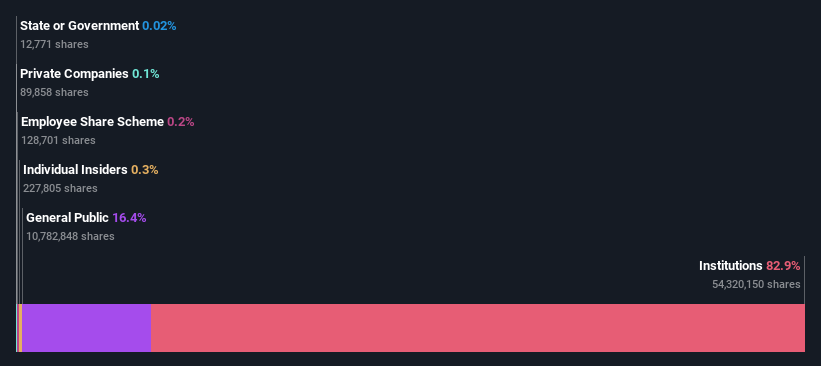Institutional owners may take dramatic actions as Genus plc's (LON:GNS) recent 5.0% drop adds to one-year losses
Key Insights
Institutions' substantial holdings in Genus implies that they have significant influence over the company's share price
50% of the business is held by the top 11 shareholders
Analyst forecasts along with ownership data serve to give a strong idea about prospects for a business
A look at the shareholders of Genus plc (LON:GNS) can tell us which group is most powerful. The group holding the most number of shares in the company, around 83% to be precise, is institutions. Put another way, the group faces the maximum upside potential (or downside risk).
And institutional investors endured the highest losses after the company's share price fell by 5.0% last week. This set of investors may especially be concerned about the current loss, which adds to a one-year loss of 34% for shareholders. Institutions or "liquidity providers" control large sums of money and therefore, these types of investors usually have a lot of influence over stock price movements. As a result, if the downtrend continues, institutions may face pressures to sell Genus, which might have negative implications on individual investors.
Let's delve deeper into each type of owner of Genus, beginning with the chart below.
View our latest analysis for Genus
What Does The Institutional Ownership Tell Us About Genus?
Institutional investors commonly compare their own returns to the returns of a commonly followed index. So they generally do consider buying larger companies that are included in the relevant benchmark index.
We can see that Genus does have institutional investors; and they hold a good portion of the company's stock. This implies the analysts working for those institutions have looked at the stock and they like it. But just like anyone else, they could be wrong. If multiple institutions change their view on a stock at the same time, you could see the share price drop fast. It's therefore worth looking at Genus' earnings history below. Of course, the future is what really matters.
Institutional investors own over 50% of the company, so together than can probably strongly influence board decisions. Hedge funds don't have many shares in Genus. The company's largest shareholder is Baillie Gifford & Co., with ownership of 8.6%. For context, the second largest shareholder holds about 6.0% of the shares outstanding, followed by an ownership of 5.9% by the third-largest shareholder.
After doing some more digging, we found that the top 11 have the combined ownership of 50% in the company, suggesting that no single shareholder has significant control over the company.
Researching institutional ownership is a good way to gauge and filter a stock's expected performance. The same can be achieved by studying analyst sentiments. There are plenty of analysts covering the stock, so it might be worth seeing what they are forecasting, too.
Insider Ownership Of Genus
The definition of company insiders can be subjective and does vary between jurisdictions. Our data reflects individual insiders, capturing board members at the very least. Management ultimately answers to the board. However, it is not uncommon for managers to be executive board members, especially if they are a founder or the CEO.
I generally consider insider ownership to be a good thing. However, on some occasions it makes it more difficult for other shareholders to hold the board accountable for decisions.
Our data suggests that insiders own under 1% of Genus plc in their own names. Keep in mind that it's a big company, and the insiders own UK£4.8m worth of shares. The absolute value might be more important than the proportional share. It is good to see board members owning shares, but it might be worth checking if those insiders have been buying.
General Public Ownership
The general public-- including retail investors -- own 16% stake in the company, and hence can't easily be ignored. This size of ownership, while considerable, may not be enough to change company policy if the decision is not in sync with other large shareholders.
Next Steps:
It's always worth thinking about the different groups who own shares in a company. But to understand Genus better, we need to consider many other factors. For example, we've discovered 1 warning sign for Genus that you should be aware of before investing here.
If you would prefer discover what analysts are predicting in terms of future growth, do not miss this free report on analyst forecasts.
NB: Figures in this article are calculated using data from the last twelve months, which refer to the 12-month period ending on the last date of the month the financial statement is dated. This may not be consistent with full year annual report figures.
Have feedback on this article? Concerned about the content? Get in touch with us directly. Alternatively, email editorial-team (at) simplywallst.com.
This article by Simply Wall St is general in nature. We provide commentary based on historical data and analyst forecasts only using an unbiased methodology and our articles are not intended to be financial advice. It does not constitute a recommendation to buy or sell any stock, and does not take account of your objectives, or your financial situation. We aim to bring you long-term focused analysis driven by fundamental data. Note that our analysis may not factor in the latest price-sensitive company announcements or qualitative material. Simply Wall St has no position in any stocks mentioned.


